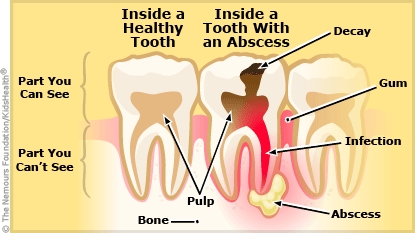- Parents Home
- Para Padres
- A to Z Dictionary
- Allergy Center
- Asthma
- Cancer
- Diabetes
- Diseases & Conditions
- Doctors & Hospitals
- Emotions & Behavior
- First Aid & Safety
- Flu (Influenza)
- Food Allergies
- General Health
- Growth & Development
- Heart Health & Conditions
- Homework Help Center
- Infections
- Newborn Care
- Nutrition & Fitness
- Play & Learn
- Pregnancy Center
- Preventing Premature Birth
- Q&A
- School & Family Life
- Sports Medicine
- Teens Home
- Para Adolescentes
- Asthma
- Be Your Best Self
- Body & Skin Care
- Cancer
- Diabetes
- Diseases & Conditions
- Drugs & Alcohol
- Flu (Influenza)
- Homework Help
- Infections
- Managing Your Weight
- Medical Care 101
- Mental Health
- Nutrition & Fitness
- Q&A
- Safety & First Aid
- School, Jobs, & Friends
- Sexual Health
- Sports Medicine
- Stress & Coping
A to Z: Abscess, Tooth
May also be called: Acute Dentoalveolar Abscess, Acute Apical Dental Abscess, Acute Dental Abscess, Apical Abscess, Tooth Abscess, Dental Abscess, Periapical Infection, Periapical Abscess, Tooth Infection, Abscessed Tooth
A tooth abscess is a collection of infected material (pus) that forms at the tip of the root of a tooth as the body fights an infection.
What Causes Tooth Abscesses?
Tooth problems that can cause a tooth abscess include:
- tooth decay (when a tooth breaks down)
- a chipped tooth
- a cracked tooth
Bacteria can enter the damaged tooth and cause an infection in the center of the tooth known as the pulp. To fight the infection, the immune system sends white blood cells. The white blood cells build up to form pus. The pus gathers and becomes an abscess at the tip of a tooth’s root.
A tooth abscess can cause severe tooth pain and sensitivity to temperature, a fever, and pain while chewing.
How Are Tooth Abscesses Treated?
Treatment for a tooth abscess may include antibiotic treatment, having a dentist drain the infection, or dental surgery.
Rarely, the dentist may have to pull the tooth.
What Else Should I Know?
If left untreated, tooth abscesses can get worse and cause serious problems. Prompt treatment can cure the infection in many cases and save the affected tooth.
To help avoid a tooth abscess, kids should avoid sweet and sticky foods, and brush their teeth twice a day and floss.

All A to Z dictionary entries are regularly reviewed by KidsHealth medical experts.

© 1995- The Nemours Foundation. KidsHealth® is a registered trademark of The Nemours Foundation. All rights reserved.
Images sourced by The Nemours Foundation and Getty Images.

